Why Us?
But don’t take our word for it!
Below is an independent evaluation of our courses,
done by Profitable Insights, London, UK
Klos Training Courses
Quality Review Report 2018
Report prepared by Profitable Insights

Klos Training has been improving the public speaking abilities, structured communication and presentation skills of corporate employees in Poland since 1995. The team at Klos Training have regularly collected end-of-course evaluation forms in order to monitor trainer delivery and client satisfaction with trainings offered.
Since 2016, Profitable Insights (a London-based consultancy http://profitableinsights.co.uk) has reviewed and analysed the quality of Klos Trainings courses as evaluated by participants every year. This report presents the results of the evaluation forms from 2018 and compares them with historical data.
Overall satisfaction with courses
In 2018 participants rated the Overall Quality of Courses very highly, and specifically the usefulness for their day-to-day job and quality of content. Klos trainers were also highly rated for their ability to increase the confidence in participants’ ability to perform better in their job when it comes to communicating effectively.
Klos Training courses obtained a 4.81 overall rating for quality – an increase from 4.77 in 2016. The evaluation forms use a standard Likert scale ranging from 5 ‘excellent’ to 1 ’poor’.

All participants have a set of expectations prior to the learning experience that determines their capacity to absorb knowledge during the course and increased probability of applying the knowledge post-event. Klos Training obtained a mean of 4.71 in 2018 for meeting expectations of participants, where 5 is best – an increase from 4.70 in 2016.
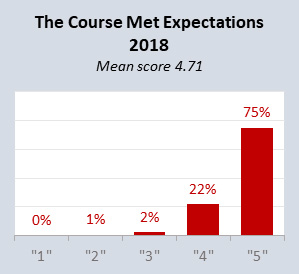
Top Results in Recommending Klos Training Courses
‘This was excellent practical learning. I will highly recommend it to colleagues.’ (Thompson Reuters participant)
Klos Training uses an internationally recognised standard of customer satisfaction, the Net Promoter Score (NPS). NPS measures the level to which clients would recommend the service to colleagues and others. A high score on the NPS correlates strongly with repurchases, referrals and other actions that contribute to a company’s growth. NPS uses a scale from 10 ‘excellent’ to 1 ‘poor’. Klos Training obtained a mean score of 9.33 in 2018.
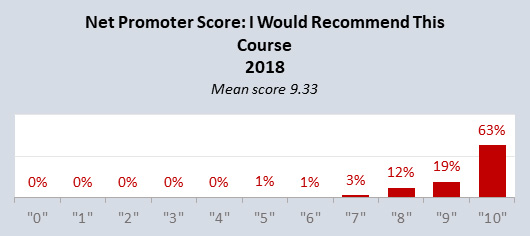
Klos Training Impact on Job Performance
The ultimate aim of corporate training is to improve participants’ ability to do their job. The more relevant to their job the training is, the more likely participants are to make use of the knowledge they acquired, practice what they learned, and consequently improve their skills further. A lot of the jobs in corporate environment, ranging from sales to any managerial position, require the ability to convey information efficiently. Consequently, training in communication and presentation skills can impact job performance directly.
The impact on job performance for Klos Training courses is measured through ratings of usefulness on the job, appreciation of course content and the practicality of the course delivery method.
High ratings for usefulness on the job
Usefulness on the job obtained one of the highest ratings – a mean of 4.71 in 2018, where 5 is the best. It is therefore to be expected that, where the job required the ability to communicate, attendance to a course has a direct impact on job performance.
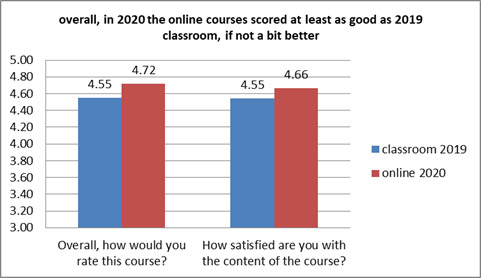
High appreciation of course content
The review of Klos Training evaluation forms established a link between higher ratings of course content and overall appreciation of the courses, which includes usefulness on the job. Content of course obtained a mean of 4.77 constantly between 2016 and 2018, where 5 is best, with the highest percentage of respondents rating it 5 ‘excellent.
Practicality of course delivery method
A high result in usefulness of courses on the job is possible by mixing high-quality content with practice. The combination of exercises, video-taped presentations and feedback sessions creates a highly active and practical course for participants at Klos Training courses. Participants see rapid improvement in their presentation style over the sessions. Additionally, the presentation skills course is co-trained with a professional voice coach.
The on-the-spot practicality of the content is mostly useful for participants: “I really loved the course. I was expecting more theoretical knowledge but it turned out that it’s better to practice and analyse.” (Unilever participant)
Klos Training Courses Build Self-efficacy
‘This was even better than I expected. I could see everybody making a great progress in just two days.’ (Mercer participant)
Building confidence in learners’ ability is key for educational success. This is known as self-efficacy and represents the extent or strength of one’s belief in one’s own ability to complete tasks and reach goals. Low self-efficacy can lead people to believe tasks to be harder than they actually are. This often results in poor task planning, as well as increased stress. As presenting in public is an especially
stressful task, any increase in self-efficacy prompts participants to take more risks, practice more and therefore improve their skills faster.
The review of Klos Training evaluations shows that increased confidence in the ability to communicate effectively is linked to the overall satisfaction with the course, and is appreciated most by the participants. The self-efficacy item obtained a mean of 4.67 in 2018 (where 5 is the best).

Klos Training courses also meet the needs of participants and contributes to their sense of achievement, which is a key ingredient in learning. Participants’ comments include the following: “It was really useful for me in order to be able to handle my stress and the audience’s eye-contact in the future.” (Skanska participant)
Klos Training Courses Build Employees’ Confidence when Presenting in English
Polish companies work in a globalised world in which English is the language of business. Klos Training, which was started by an American, offers their clients communication and presentations skills in English run by trainers who are native speakers. Participants can get a double benefit – improving their communication skills and practicing English at the same time.
Speaking and presenting in public is hard enough. When participants need to present in a second language, they can no longer rely on the speed and spontaneity that their native language may give them. The fear to speak up because of possible
mistakes increases and adds on top of any existing fear of public speaking. In the words of one participant: [MISSING QUOTE!]
The courses in English were rated more highly than average overall. In 2016 the highest ratings obtained for the courses delivered in English was a mean of 4.7 in self-efficacy (‘more confident in my abilities’) compared to a 4.68 mean overall. Meeting participants’ scores for met my needs and usefulness on the job for these courses were also higher than overall average.
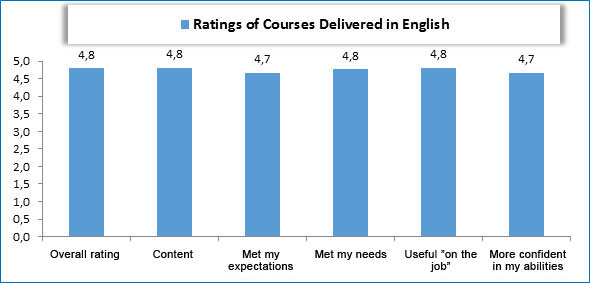
Klos Training Presentation Skills Courses are Most Valued
‘This is a really awesome course – different from anything I have attended before. Thank you.’ (Thompson Reuters participant)
Klos Training also offers courses in structured and other forms of communication, customer service and job engagement. The best ratings were obtained by the presentation skills courses.
In an extended analysis of the main presentation skills course Speak with Confidence©, the ratings for all questions have increased year on year since 2015, with a marked improvement from 2017 to 2018 – see chart below:

Klos Trainers are Highly Rated for their Style and Knowledge
‘It was great, specifically I enjoyed the level of the trainer’s involvement into our cases, and her openness to questions which at times strayed outside the scope of the course.’ (Schneider Electric participant)
As Klos Training offers mainly classroom-based courses, the quality of courses depends highly on the quality of trainers and their skills and ability to engage the audience. Klos trainers get consistent overall ratings of their style and knowledge when it comes to speaking and presenting in public courses. Participants would recommend them highly and greatly appreciate the feedback they receive during courses.
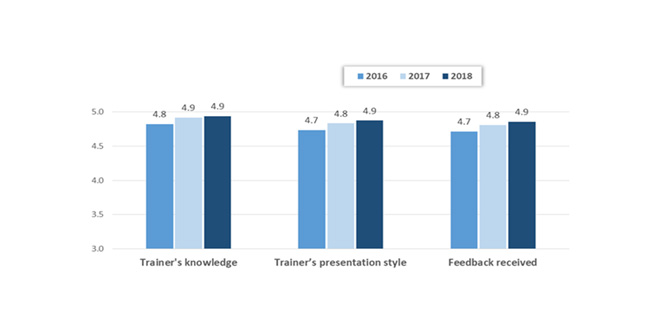
The graph above illustrates the year on year positive evolution on questions regarding trainers’ knowledge, presentation style and feedback. The results are from the last three years of data and feedback received is essential in improving that participants feel when they finish a course: ‘In general, training is very stressful and you know exactly what am I doing wrong. But at the end I get good feedback and I know everything I need to do to improve. You are the best.’ (Philip Morris participant)
